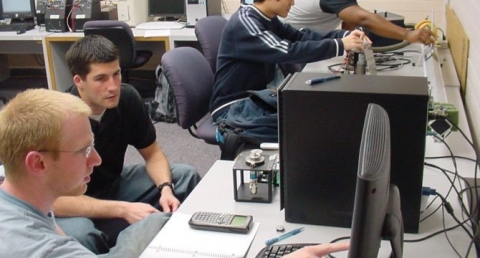Attracting More Engineering Students Through Systematic Lab Expansion

Utah State University boasts of being located in one of the most beautiful valleys in the Rocky Mountains. But that is definitely not the main reason why this 120 years old institution attracts students. Rather than the beauty of surrounding nature, Utah State University relies on its reputation of intellectual and technological leadership and progressive teaching and research – represented for example by the Department of Electrical and Computer Engineering (ECE).
Challenge
Building a world-class mechatronics lab with limited funding
Back in the early 2000s, faculty of ECE started to understand the value of teaching students multidisciplinary skills, combining mechanical, electronic, control systems and computer engineering in one subject – Mechatronics. In 2002, they started to build a lab dedicated to the subject, which now offers world-class hands-on experience to undergraduate and graduate students. How did they achieve it? “Definitely not overnight,” laughs Dr. YangQuan Chen, Assistant Professor at the department, “and we are still not done.”
Solution
Modular equipment is key
ECE started to build the Mechatronics laboratory utilizing the Quanser lab equipment the department already had and adding new modules every year.
Building the lab over an extended period of time, compatibility of all components becomes vital. “The modularity of Quanser equipment was very nice for us, we could build a sophisticated lab from scratch incrementally,” continues Dr. Chen. “The environment remained the same – now we have Ball and Beam experiment, Flexible Link, Flexible Joint, Rotary Inverted Pendulum, 2 DOF Robot Arm, Solar Tracker to name just a few and it is still ‘plug and play’ – nothing really changed. We are pretty happy with that.”
Access to a wider range of experiments acquired over the years is not the only advantage Mechatronics lab can offer the students. “At the beginning, when we had only a few stations in the lab, students worked in larger groups,” notes Dr. Chen. “Eventually we achieved our goal, having one student per station.” That for sure increases the attractiveness of the Mechatronics course. “Yes,” agrees Dr. Chen, “our Mechatronics course is very lab-intensive. We attract students who previously did not get enough on-hands experience, which is a very important factor in why they select this course.”
Result
Real-time in no time
“Students like to work with Quanser equipment,” Dr. Chen goes on. “It is easy for them to get started. They just follow the wiring procedure and everything else is just mouse-clicking. Using Quanser rapid control prototyping and real-time software they can control physical systems in no time. As I say – ‘go to the real-time in no time!’ That’s really exciting and the students are impressed.”
Dr. Chen and his colleagues have also developed several in-house mechatronic plants such as liquid level control system, fractional horsepower dynamometer, fan-and-plate etc. “They can be easily hooked up with Quanser real-time control toolbox to experiment with real-time closed-loop controls,” explains Dr. Chen. “This rapid prototyping of real-time control system enabled by Quanser products is really attractive to both undergraduate and graduate students.”
In the future Dr. Chen plans to continue adding new experiments to the Mechatronics laboratory. He gets really excited when hearing about a 2 DOF Ball Balancer, a new Rotary Family experiment. But he would also like to make his lab accessible to more students. “Even education is getting global. I am really looking forward to making my laboratory available to all the students in the world who want to get the mechatronics and learning experience here at Utah State University,” says Dr. Chen enthusiastically.
As Michael Armata of Quanser’s Marketing team puts it: “Quanser has the same goal – reaching out to all corners of the global village and making our world-class control laboratories available to all students. To capture their imagination, to excite them about learning and researching and to provide a key piece to the valuable on-hands experience necessary for their future studies and for the rest of their professional lives.”
Dr. YangQuan Chen joined Utah State University in 2002 and has been an Assistant Professor in the Department of Electrical and Computer Engineering since 2002 and Acting Director of Center for Self-Organizing and Intelligent Systems (CSOIS) since 2004. He is teaching graduate and upper-level undergraduate courses. His current areas of research interests include distributed measurement and distributed control of distributed parameter systems using mobile actuator and sensor networks, mechatronics and controls (intelligent, optimal, robust, nonlinear and adaptive) and fractional order controller tuning. He holds 13 granted and pending U.S. patents. He co-authored two research monographs (Springer 1999, 2007), 5 textbooks (Tsinghua University Press 2002, 2004, 2004, 2007, SIAM 2007, CRS 2008) and authored over 200 refereed journal and conference papers.
Quanser

The global standard in transformational engineering labs for Controls, Robotics, and Mechatronics, optimized for the academic setting.
Academic institutions trust Quanser to strengthen their reputation through transformative teaching and research labs that accurately replicate theories and bring engineering mathematics and concepts to life.
“We are in a golden age of engineering education. There’s a lot to be excited about and a lot to be challenged by. The education we offer students must capture this momentum and help them realize their potential.”
– Paul Gilbert, CEO, Quanser



